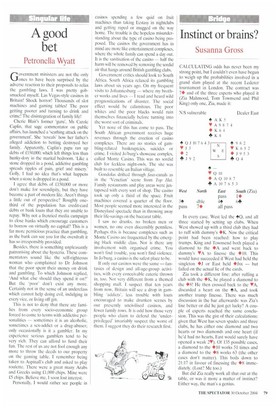A good bet
Petronella Wyatt
Government ministers are not the only ones to have been surprised by the adverse reaction to their proposals to relax the gambling laws. I was pretty gobsmacked myself. Las Vegas-style casinos in Britain! Shock horror! Thousands of slot machines and gaming tables! The poor getting poorer and turning to drink and crime! The disintegration of family life!
Cherie Blair's former 'guru', Ms Carole Caplin, that sage commentator on public affairs, has launched a 'scathing attack on the government'. She 'reveals' how her father's alleged addiction to betting destroyed her family. Apparently, Caplin's papa ran up debts of £150,000, which left things less than hunky-dory in the marital bedroom. 'Like a stone dropped in a pond, addictive gambling spreads ripples of pain, grief and misery.' Golly, I had no idea that's what happens when a stone is dropped in a pond.
I agree that debts of £150,000 or more don't make for serendipity, but they have become a part of modern life. Aren't things a little out of perspective'? Roughly onethird of the population has credit-card debts or bank loans that they are unable to repay. Why not a frenzied media campaign to close banks which encourage customers to borrow on virtually no capital? This is a far more pernicious practice than gambling, as the bank can sue you for the overdraft it has so irresponsibly provided.
Besides, there is something unpleasantly patronising about the hysteria. These commentators sound like the self-righteous woman who complained to Dr Johnson that the poor spent their money on drink and gambling. To which Johnson replied, 'And what else should they spend it on?' But the 'poor' don't exist any more. Certainly not in the sense of an underclass which cannot help doing evil, indulging in every vice, or living off gin.
This is not to deny that there are families from every socio-economic group forced to come to terms with addictive personalities — sometimes it is an alcoholic, sometimes a sex-addict or a drug-abuser; only occasionally is it a gambler. In my experience serious gamblers tend to be very rich. They can afford to fund their fun. The rest of us are not fool enough any more to throw the deeds to our property on the gaming table. I remember being taken to Aspinall's club and asked to play roulette. There were a great many Arabs and Greeks using £1,000 chips. Mine were £5 chips. Believe me, I soon lost interest.
Personally, I would rather see people in casinos spending a few quid on fruit machines than taking Ecstasy in nightclubs and getting raped or mugged on the way home. The trouble is the hopeless misunderstanding about the type of casino being proposed. The casinos the government has in mind are more like entertainment complexes, where the whole family can spend a day out. It is the sanitisation of the casino — half the harm will be removed by removing the sordid air that hangs around British gambling clubs.
Government critics should look to South Africa. South Africa relaxed its gambling laws about six years ago. On my frequent visits to Johannesburg — where my brother works and lives — I read and heard wild prognostications of disaster. The social effect would be calamitous. The poor whites and the poor blacks would ruin themselves financially before turning into the worst sort of criminals.
Yet none of this has come to pass. The South African government receives huge revenues through the erection of casino complexes. There are no stories of gambling-related bankruptcies, suicides or crime. I visited Jo'burg's showcase complex, called Monte Casino. This was no sordid club for feckless night-owls. The site was built to resemble an Italian village.
Gondolas drifted through fawc-canals as in the 'Venetian' scene from Top Hat. Family restaurants and play areas were juxtaposed with every sort of shop. The casino took up only a third of the space. Fruit machines covered a quarter of the floor. Most people seemed more interested in the Disneyland spectacle than in throwing away their life-savings on the baccarat table.
I saw no drunks, no broken men or women, no one even discernibly penniless. Perhaps this is because complexes such as Monte Casino are frequented by the emerging black middle class. Nor is there any involvement with organised crime. You won't find trouble, you won't find violence. In Jo'burg. a casino is the safest place to be.
If only our casinos were the same — fantasies of design and all-age-group activities, with every conceivable eaterie thrown in, too. Not very different from a themed shopping mall. I suspect that ten years from now, Britain will see a drop in gambling 'addicts', less trouble with louts encouraged to make drunken scenes by our presently uncivilised casinos, and fewer family rows. It is odd how those very people who claim to defend the 'underprivileged' invariably suspect the worst of them. I suggest they do their research first.


















































































































 Previous page
Previous page